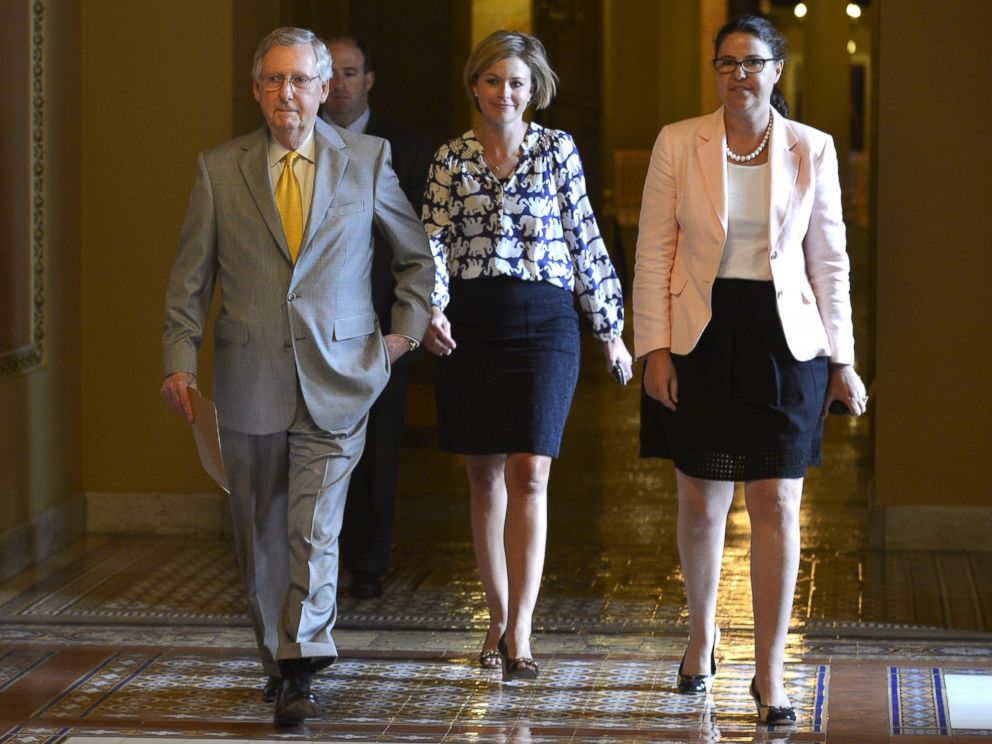NSA Domestic Surveillance Program Expires After Senate Fails to Reach Deal
The Senate was unable to reach a deal after a rare Sunday session.
— -- The NSA's domestic surveillance program expired at midnight after the Senate failed to reach a deal to pass legislation Sunday evening.
The expiration came after the Senate convened for a rare Sunday session to deal with the expiring provisions of the Patriot Act.
Before adjourning without reaching a deal, the Senate made some progress, clearing a key procedural hurdle on the USA Freedom Act, but due to procedural objections by Sen. Rand Paul, the Senate was unable to hold any additional votes to move forward with the measure.
Three key provisions of the Patriot Act expired at midnight -- Section 215, which authorizes the NSA's bulk collection of Americans' phone records; a roving wiretap provision that allows law enforcement officials to monitor terror suspects that use multiple phones; and a program that officials can use to monitor "lone wolf" terror suspects, not connected to any known terrorist organizations.
The NSA started the shutdown process at 4 p.m. Sunday. It will take an entire day to reboot the system, if Congress passes legislation reforming the metadata collection program.
Senators returned to Capitol Hill Sunday afternoon, just hours before key provisions of the Patriot Act, including the NSA's controversial bulk collection of American's phone records, were set to expire.
The Senate cleared a key procedural hurdle on the House-passed USA Freedom Act with a vote of 77 to 17. But objections by Paul, R-Kentucky, delayed further votes on the measure.
Senate Majority Leader Mitch McConnell originally opposed the House-passed USA Freedom Act, but Sunday, he said it was the only option.
"It certainly is not ideal," McConnell said. "This is where we are, colleagues. A House-passed bill with some serious flaws. An inability to get a short-term extension to try to improve the House-passed bill in the way we would normally do this."

The White House urged lawmakers to act quickly in the coming days to reach an agreement to pass the House bill.
"The Senate took an important -- if late -- step forward tonight," White House spokesman Josh Earnest said in a statement Sunday. "We call on the Senate to ensure this irresponsible lapse in authorities is as short-lived as possible. On a matter as critical as our national security, individual senators must put aside their partisan motivations and act swiftly."
Shortly before the vote, McConnell tried to hold a vote for a two-week extension the "lone wolf" and roving wiretaps provisions. But Paul, who has said he will force the expiration of the NSA's domestic surveillance program, objected.
It was a tense moment between Paul and McConnell, who has endorsed Paul's 2016 presidential bid. Speaking on the Senate floor, McConnell blasted the opponents of the NSA program, a direct shot at Paul.
"We shouldn't be disarming unilaterally as our enemies grow more sophisticated and aggressive and we certainly shouldn't be doing so based on a campaign of demagoguery and disinformation launched in the unlawful actions of Edward Snowden," McConnell said.
Paul has promised to use procedural maneuvers to "force the expiration" of the domestic spying program.
"We are here this evening because this is a very important debate. This is a debate over the Bill of Rights. This is a debate over the Fourth Amendment. This is a debate over your right to be left alone," Paul said on the Senate floor Sunday. "We are not collecting the information of spies. We are not collecting the information of terrorists. We are collecting all American citizens' records all of the time.
"I'm not going to take it anymore. I don't think the American people are going to take it anymore," Paul said.
Early in the afternoon, Senate Democrats urged McConnell to pass the USA Freedom Act.
"Just take it up and pass it," Sen. Patrick Leahy, one of the lead sponsors of the measure, shouted on the Senate floor.
"The time for excuses and inaction has passed. The American people, the intelligence community professionals that strive to protect them deserve better. We have a few hours to work things out and pass the USA Freedom act, but there's no room for error. There's very little time," Leahy said. "The deadline to act is midnight tonight."




